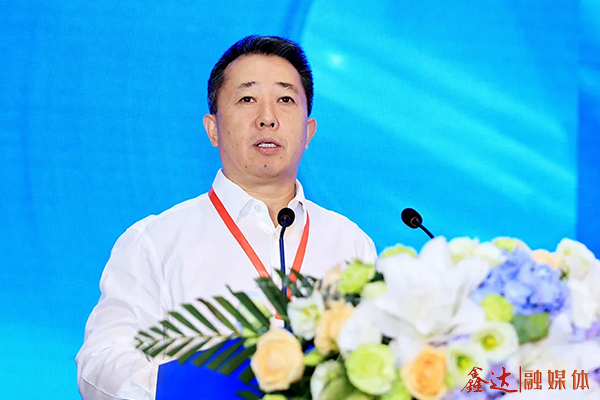"At present, the development of the steel industry is once again facing difficulties, in the face of the new situation, we must strengthen confidence, take the Third Plenary Session of the 20th Central Committee reform east wind, under the guidance of new quality productivity, under the blessing of digitalization and intelligence, promote the integration of green and steel industry, and continue to promote the high-quality development of the steel industry with a high level of ecological environment protection." On July 20, at the 2024 (15th) Steel Industry Energy Conservation and Emission Reduction Conference, Liu Bingjiang, chief engineer of the Ministry of Ecology and Environment, said in a keynote speech.

It is of great significance for the steel industry to promote ultra-low emission transformation
"The energy conservation and emission reduction conference of the steel industry has been held for 15 consecutive years, and these 15 years are also the 15 years in which China's ecological environment quality improvement has made remarkable achievements." Liu Bingjiang said that the steel industry has made important contributions to the continuous improvement of China's air quality by implementing a series of major initiatives and major projects such as supply-side structural reform, ultra-low emission transformation, and extreme energy efficiency projects.
First, we will take comprehensive measures to help improve air quality continuously. Up to now, 43% of China's crude steel production capacity has completed the ultra-low emission transformation of the whole process, 39% of the crude steel production capacity has completed the transformation of key links, and the emission of pollutants in the steel industry has decreased by 60%, and the emission performance has reached the international leading level. Compared with the ultra-low emission transformation in 2018, the average PM2.5 concentration in the 10 cities with concentrated steel production capacity in 2023 fell by 24%, and the average PM2.5 concentration in Tangshan and Handan, Hebei, with the most concentrated production capacity, fell by 31% and 30%, respectively.
Second, coordinate to help the green transformation of the industry. "The ultra-low emission transformation breaks the original traditional concept of end-treatment, and puts forward whole-process and whole-link transformation requirements for organized emission, unorganized emission and clean transportation." Liu Bingjiang introduced. It is estimated that the iron and steel industry in the implementation of ultra-low emission transformation, in addition to offsetting the increased carbon emissions at the end of the treatment, but also to reduce 1% to 2% of carbon emissions (about 40 million tons). According to statistics, by the end of 2023, the profit margin of enterprises that have completed ultra-low emission transformation is 2.6 times that of other enterprises.
Third, innovative ideas help improve new quality productivity. The implementation of ultra-low emission transformation in the steel industry, through technological innovation, policy innovation, management innovation to achieve digital, intelligent, green and traditional industry integration development, provides a useful reference for other industries. "Through the transformation, the effective social investment has exceeded 600 billion yuan." Liu Bingjiang said that ultra-low emission transformation is of great significance in terms of technological innovation, policy innovation and management innovation.
The task of reducing pollution and carbon in the steel industry is still arduous
Liu Bingjiang said that at present, the task of reducing pollution and carbon in the steel industry is still difficult, mainly in the following aspects:
First, the situation of air pollution remains grim. "Air pollution in key areas is still heavy, and heavy pollution weather is still frequent and frequent." Liu Bingjiang introduced that most of the top 20 major cities with concentrated steel production capacity ranked outside the 100 of the 168 key cities in the country's comprehensive index of ambient air quality. Overall, the inflection point of air quality improvement in China from quantitative change to qualitative change has not yet appeared, and the difficulty of air quality improvement continues to increase.
Second, structural problems have yet to be fundamentally solved. China's steel production capacity layout in the key areas of air pollution prevention and control is too concentrated, such as the Beijing-Tianjin-Hebei and surrounding areas of the five provinces only accounted for 5.6% of the country's land area, but the production of 33% of the country's steel, 19% of the coke, per unit of land area of the main pollutants in the atmosphere emissions are 3 to 4 times the national average level.
"The energy structure of the steel industry is dominated by coal, the process structure is dominated by long process, and the transportation structure is dominated by highway, which has not been reversed, especially the proportion of short-process electric furnace steel production capacity is relatively large compared with the global average level." Liu Bingjiang said, "In the past two years, the central ecological environment and environmental protection inspectors found that the illegal construction of steel enterprises and the implementation of capacity replacement policies are not in place."
Third, "lack of chain" leads to energy waste and increased emissions. Liu Bingjiang said that in recent years, a large number of steel projects after completion do not match the upstream and downstream, and even some processes are missing, and a large number of independent coking, pelletizing, and steel rolling enterprises have appeared around the steel production capacity concentration area. According to statistics, there are still 66 independent coking enterprises, 43 pellet enterprises and nearly 300 hot rolling enterprises in the four provinces of Tianjin-Hebei, Lu-Henan.
Liu Bingjiang believes that the "lack of chain" leads to high-quality energy such as coke oven gas can not be fully utilized, the material through heavy trucks in the enterprise mutual "flip", billet repeated heating, is not conducive to the development of hydrogen metallurgy and other key industries to reduce pollution and carbon technology, but also cause a great waste of social resources and energy, but also increased vehicle exhaust, dust pollution and carbon emissions.
Maintain strategic focus and continue to consolidate the achievements of green development of the industry
"The development of new quality productivity is not to ignore and abandon traditional industries, but to transform and upgrade traditional industries with new technologies, new means and new ideas." In the next step, we will cooperate with relevant departments to promote the deep integration of green and traditional industries, and continue to consolidate the green development of the steel industry." Liu Bingjiang proposed.
First, we must strengthen confidence to ensure that the ultra-low emission transformation comes to an end. "The ultra-low emission transformation is only more than one year away from the end, and the task of completing the proposed transformation target of 80% of the country's crude steel production capacity remains unchanged." For the remaining 20 percent, we will take differentiated management measures together with relevant departments." Liu Bingjiang said that under the current situation, the steel industry should maintain strategic focus and overcome difficulties. Enterprises that have not yet completed the transformation must seize the time to complete it with quality and quantity. Enterprises that have completed transformation and publicity should attach importance to the establishment of a long-term mechanism.
Liu Bingjiang put forward: "We will 'measure to the end with a ruler', do not encourage stricter standards, and will never lower standards." We have established a problem ledger for each public company, and we may go to the research at any time, and the idea of taking advantage of opportunities is not advisable. Enterprises must pay attention to environmental management, strengthen standardized operation management, and strictly abide by the bottom line of the law."
Second, we should promote the good and eliminate the bad, and protect the green and high-quality productive forces. "Looking back, the most concentrated years of iron and steel enterprises implementing ultra-low emission transformation are also the best years of industry profitability, it can be seen that environmental protection 'supporting the elimination of bad' has a positive regulatory effect on the overall situation of the industry." Liu Bingjiang said that in the future, the management ideas of supporting the good and eliminating the bad will be more in-depth, the differentiated management policy will be clearer, and the efforts of "encouraging advanced and encouraging backward" will be further increased, and advanced productivity will be fully released through differentiated policies.
"We will guide local governments to strictly implement differentiated management measures to avoid whipping fast cows." In response to the inadequate implementation of preferential policies for some local A-level enterprises reported by enterprises, we will also strengthen guidance, guide environmental protection policies not to increase layers, resolutely oppose 'ultra-low', and strive to avoid bad money driving out good money." Liu Bingjiang said.

 Email
Email Email
Email
